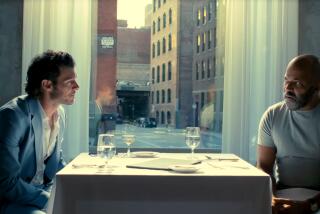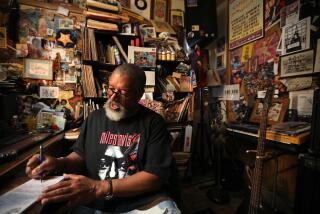How to Be a Minor Writer
- Share via
No one ever sets out to be a minor writer, any more than any would-be baseball player pictures himself winding up as a utility infielder.
I remember as a boy growing up in Brooklyn--when the Dodgers were still at Ebbets Field--that I could never conceive how a Pete Coscarart or Johnny Hudson, the fifth infielder who rarely got to play, could just sit it out on the bench game after game. I marveled at their indomitable patience, because I was certain that if I were privileged enough to be in their spikes I would have angrily slammed my glove to the dugout floor, turned about and stomped home. How could any one with the talent to reach the big leagues settle for a substitute--or minor--role? I simply could not understand it.
But now after four decades as a professional writer I am at best a minor writer. Never mind that I’ve had seven books published, had plays produced both on and off-Broadway, written big-screen and television movies. My name is neither a household word nor one bandied about at anyone’s high table. But I am still not about to pick up my laptop and shuffle off home. Which makes me--to complete the baseball analogy--not unlike Frank Sullivan, the Red Sox pitcher who once described himself as being “in the twilight of a mediocre career.”
Yet if I find myself winding up--or down--a minor writer, I am not terribly disheartened by that fate. In fact I am rather proud of the company I must finally keep. After all, as Gertrude Stein once said, “Some of us may become major figures but we’re all minor writers.”
And, indeed, weren’t Ivan Goncharov and Mikhail Lermontov and Tadeusz Borowski and Maurice Magnus and Mario Soldati and Don Marquis and Nathanael West and John Horne Burns and Roark Bradford and Alan Harrington and Flann O’Brian, not to mention Stein herself, for example, all minor writers? Scarcely a Babe Ruth in the bunch by world-class standards. But they all have, in one book or another, certainly provided me with better and more imaginative reads than, say, such heavyweights as Tolstoy or Henry James.
As I say, I did not set out to be a minor writer. But somehow I do seem to have traveled down some well-rutted literary paths--and by-paths. Too often I’ve had to answer a call from the bank instead of responding to pangs of creativity. Indeed, in the pursuit of a livelihood I have engaged in almost every form of writing--and wrighting--known to modern man, from penning promotional booklets for the Boy Scouts to issuing instructional directions on how to douche for Madison Avenue; from interviewing porn-film stars for Sunday pieces to inscribing words for a George Burns God to utter on a film screen.
Not that there is any single direct access route to minor writerhood. As if by definition, almost all roads are seductively indirect. But what most clearly charts the modern minor-writer trail are three distinct character markings:
1) An overwhelming tendency to lean toward a slightness of subject matter.
2) An infinite capacity for transient distractions such as small wars, petty politics and family finances.
3) And, finally, a most meager output considering the seeming quantity of energy expended; in other words, a curriculum vitae of spent opportunities.
The environments that currently--and also most traditionally--nurture developing minor writers are:
a) Show business:
Theatre, film, television, any activity in which the writer’s contribution is most often described as “collaborative.” Major writers simply do not collaborate; they view writing as an individual activity, as far removed from team sports as, say, pole vaulting is from crew.
b) Journalism:
Major writers eschew daily reporting, weekly reviewing or spending a year authoring an “as told to” celebrity biography for a cash-rich publisher. The major writer is haunted and driven by a subject, not hired by it or because of it.
c) Academe:
The major writer never forgets for a single second that life’s true arena is as tilted as Sisyphus’ incline. Only minor writers putter about on the artificially leveled playing fields of colleges and universities, developing inflated senses of self-importance as they mix and mingle with pen pals and captive audiences.
Indeed, settling for less without great heroics but not without certain smaller pleasures is a hallmark of the minor writer. Turning in a 750-word journalistic tome soothes the dream of a 75,000-word novel; a TV sitcom treatment replaces the call of a five-act tragedy; presiding over a seminar of attentive and admiring students becomes the surrogate for a sonnet sequence of Spenserian stanzas.
At the same time, the minor writer has to be ever ready to defend his or her trivial pursuits. Notice, for example, at the beginning of this piece, how quickly I invoked the likes of Nathanael West, and how cleverly I will now manage to bring his name up again as I end it.
A textbook minor-writer diversion is covering an alleged major figure’s extracurricular activities. I can vividly recall walking through the streets of Philadelphia with Norman Mailer one evening while he was involved in the ownership of a lightweight boxer, Joe Harris. We had both driven up from New York to see Harris in action, but at the moment, Mailer and I were talking not boxing but books. And when I happened to disagree with one of his pontifications, he said disparagingly: “When it comes to writing, what do you know? After all, you’re only a gnatweight.”
A wicked jab. But I did not have the stuff of a minor writer for nothing. I quickly countered: “What’s wrong with being a gnatweight? Nathanael West was a gnatweight.” And then I went on to cite some of the many other “gnatweights” whose literary company I preferred to that of many so-called heavyweights.
And Mailer let the volley rest, perhaps fearing that I might soon unleash the sharpest saw of all: that while a minor writer cannot be reduced in stature through reexamination by posterity, the status of any so-called major writer was always prey to that danger. Johnny Hudson and Pete Coscarart and Frank Sullivan are all firmly ensconced in their places in baseball trivia. But how sure could Mailer be of his own final literary resting place?
Yes, I am not unhappy being a minor writer, even a gnatweight, after all; what is much more important to me at the moment is simply getting to bat again. But l also must confess that as I write these words --lit crit and lit prattle being typical minor-writer dodges--I have recently begun a novel that seems to me the kind of work only produced by a major writer. But I guess every batter as he strides up to the plate dreams of hitting the long ball. And then after taking two pitches, just tries to hit to right once more, prepared to return to the dugout satisfied if he can somehow manage to move the base runner along.
More to Read
Are you a true-blue fan?
Get our Dodgers Dugout newsletter for insights, news and much more.
You may occasionally receive promotional content from the Los Angeles Times.









